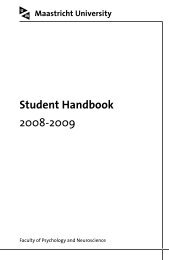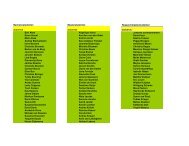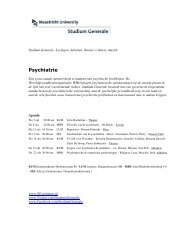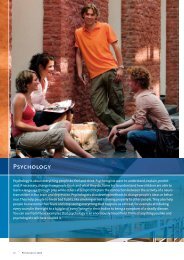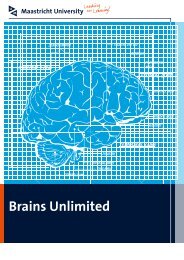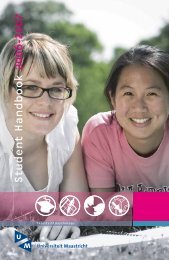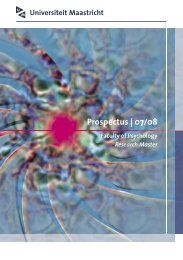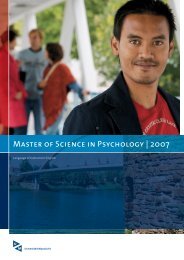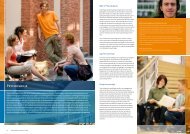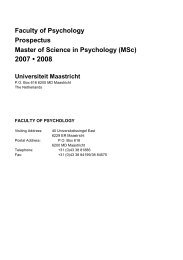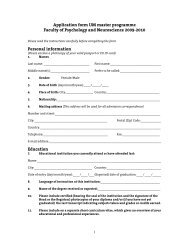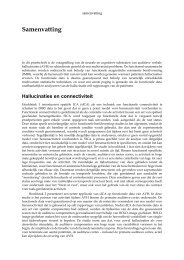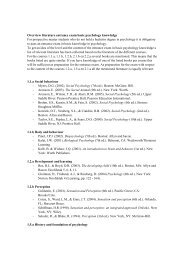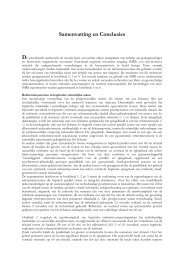Prospectus | 08/09 - Psychology and Neuroscience - Maastricht ...
Prospectus | 08/09 - Psychology and Neuroscience - Maastricht ...
Prospectus | 08/09 - Psychology and Neuroscience - Maastricht ...
You also want an ePaper? Increase the reach of your titles
YUMPU automatically turns print PDFs into web optimized ePapers that Google loves.
<strong>Prospectus</strong> Research Master <strong>Psychology</strong> 20<strong>08</strong> • 20<strong>09</strong><br />
126<br />
30 minutes after the test has started. After this, admission will be refused <strong>and</strong> no<br />
extension of the duration of the test will be granted. Students are not allowed to<br />
leave the room where the test is taken, until at least 30 minutes after the test has<br />
started.<br />
3. A condition for taking course examinations is the compliance with the minimum<br />
requirements for participation in the group meetings as laid down in article 4 of<br />
section 5.2.<br />
4. The Board of Examiners can draw up guidelines for written papers or other forms of<br />
assesment. These guidelines will be included in the programme’s <strong>Prospectus</strong> or in the<br />
manual pertaining to the relevant part.<br />
5. Students with a functional disability may request permission from the Board of<br />
Examiners to take the tests in a manner that is, as far as is possible, in keeping with<br />
their h<strong>and</strong>icap. The Board of Examiners can ask for expert advice before arriving at a<br />
decision.<br />
6. During written examinations students are not allowed to carry electronic devices<br />
other than those specified in the course manual. The exam will be declared invalid if<br />
the student does not conform to this regulation. If a student is discovered to be using<br />
a cellular phone or an electronic agenda during the examination, the fraud regulation<br />
will be applied.<br />
Article 3.4 Oral Tests<br />
1. Oral tests are permitted only in special cases <strong>and</strong> can be conducted only if the<br />
examiner has received approval by the Board of Examiners.<br />
2. Oral tests are not given to more than one person at the time.<br />
3. An oral test is administered by two examiners, unless the Board of Examiners has<br />
decided otherwise.<br />
4. Administering an oral test is done publicly, unless the Board of Examiners or the<br />
relevant examiner has decided otherwise in a special case, or if the student has raised<br />
objections to this.<br />
Article 3.5 Attendance at Tutorial Group Meetings<br />
1. The Board of Examiners lays down the minimum of tutorial group meetings a student<br />
is required to attend in the rules <strong>and</strong> regulations <strong>and</strong> determines how the actual<br />
attendance of each student in the education is registered.<br />
2. Students who do not comply with this minimum attendance requirement for<br />
the tutorial group meetings, but who have not missed more than one meeting<br />
than is allowed, can still comply with the compulsory attendance requirement by<br />
applying for a compensatory assignment from the Board of Examiners, no later<br />
than two weeks after the relevant course has ended. At most, three requests for a<br />
compensatory assignment will be granted to a student in each academic year. The<br />
Board of Examiners will inform the student whether permission for a compensatory<br />
assignment has been granted no later than four weeks after the course assessment<br />
has taken place.<br />
3. If attendance has been met in a given academic year this will be valid for the<br />
remainder of the study even if the test is not passed in that year.



